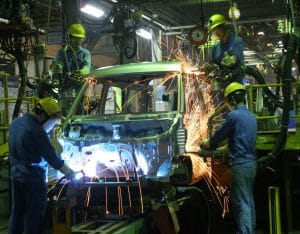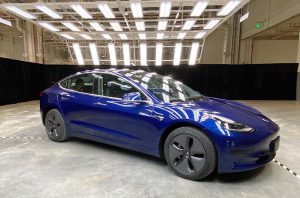
New vehicle sales in China are coming back strong with the industry reporting its first year-over-year sales increase in two years.
Chinese car sales appear to be coming back strong as the Asian giant’s coronavirus crisis fades away, demand rising by as much as 0.9% year-over-year, the China Association of Automobile Manufacturers, or CAAM, said in a preliminary report.
That would mark a massive turnaround from just two months ago, when Chinese car sales all but stopped as COVID-19, the disease caused by the coronavirus, swept through the country. More significantly, if the final numbers hold true to the initial estimate, it would mark the first time sales in China have grown, year-over-year, since mid-2018.
Even so, the country is a long way from a full recovery, said Michael Dunne, founder of Asian automotive consulting firm ZoZo Go. The situation in China is “still bumpy and uncertain,” Dunne said during a virtual meeting of the Automotive Press Association, and full-year sales are still likely to be down as much as 20% from 2019 numbers. That would be a decline of as many as 4 million vehicles.
(GM’s April sales in China rebound, rising 13.6 percent.)
While China was the source of the coronavirus outbreak – and many experts believe it botched its initial response to the crisis – Dunne said that local and national governments took aggressive steps once they did step in. Even entering your own apartment building may now be a multistep process, he noted, requiring proof of residency and having one’s temperature taken.
“It’s adapting to a new situation,” said Dunne, with similarly aggressive steps in place at the hundreds of automotive plants across the country. Most of those are now up and running again, though not all at pre-pandemic production levels.

Tesla’s been selling its Model 3 sedans built at the Shanghai Gigafactory like gangbusters in China.
The Beijing government is using the pandemic to accelerate one of its key plans for the auto industry, a shift from internal combustion engines to battery power, noted Dunne. It has largely extended financial support so that, “Most people buying EVs still enjoy subsidies. They’re really trying to (use the crisis) to steer demand.”
One of the beneficiaries has proven to be Tesla which opened its second Gigafactory late last year near Shanghai.
“They defied gravity in the first quarter,” noted Dunne, “selling 20,000 Model 3s through the shutdown.”
The situation wasn’t nearly as positive for the three other U.S. automakers competing in China. “They’ve really taken it on the chin,” Dunne said, referring to General Motors, Ford and Fiat Chrysler.
(China trims back recently extended NEV subsidies.)
GM was one of the first foreign manufacturers to enter the Chinese market more than two decades ago and, for years, was one of the top two players there. But it has seen sales fall from a peak of 4 million to around 2.4 million last year, in part due to increased competition, but also due to product problems, said Dunne.
Ford, which got a relatively late start in China, he added, is now off more than half from its own peak, while FCA’s Jeep brand “is just struggling to survive.”
While Volkswagen and its various joint venture partners remain dominant, a handful of local manufacturers are gaining a stronger grip on the Chinese market. These include six closely tied with the Beijing and various regional governments, including Shanghai Automotive Industry Consortium and First Auto Works. Then there are three independents, including Geely, BYD and Great Wall.
While the Chinese market is showing signs of recovery, the problems of the last two years have further encouraged domestic manufacturers to seek out new opportunities abroad. Chinese carmakers have begun reaching into Third World markets and even parts of Europe. The real challenge is breaking into the U.S., said Dunne.
Several companies already have advanced operations in the States, he noted, and were hoping to begin retail operations this year. That’s now been set back by the coronavirus crisis, but Dunne stressed that it just is a matter of time.
The first Chinese brand to enter the U.S. is now likely to be Zotye which has already recruited 100 dealers. It will be followed by a subsidiary of China’s Great Wall, Dunne forecast.
(Tesla China sales jump as post-pandemic auto production resumes.)
Expect the two companies to “take from the playbook of the Japanese,” pushing for high-volume sales of low-cost products. But the Chinese, he added, have broader aspirations and he expects some players will also take aim at the U.S. luxury market, much as Hyundai has done with its Genesis brand.

